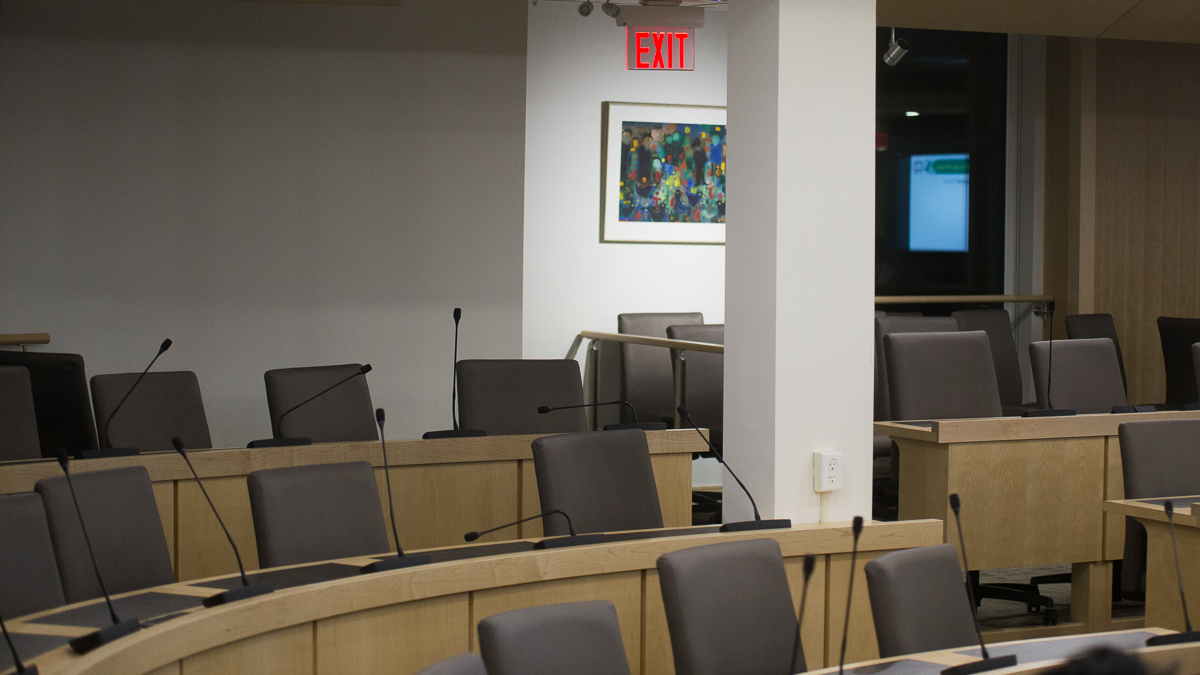GFC motion to add academic staff members fails, strategic plan discussed
"There is no university strategic plan if faculty, staff, and students, are not with us on the journey," interim provost and vice-president (academic) says.
 Rosty Soroka
Rosty SorokaAt the General Faculties Council (GFC) meeting on April 17, a proposal for the addition of 38 academic staff members to GFC failed, and the first draft of the University of Alberta Strategic Plan (USP) was discussed.
Carolyn Sale, an elected academic staff member, made a motion that proposed appointing 38 additional members of academic staff in full-time positions to GFC, so that academic staff make-up at least 51 per cent of GFC’s membership.
Currently, academic staff make-up 39 per cent of GFC’s membership, while students make-up 36 per cent.
“With the composition of GFC changed to ensure that academic staff constitute a minimum of 51 per cent, students and academic staff will be able to work together in more powerful ways, consistent with the academic mission, to ensure that this body properly functions as the university’s senior academic body,” Sale said.
Sale said that changing GFC’s composition would ensure that staff get more of a say in future decision-making, especially in light of recent academic and administrative changes.
“The challenges [GFC has] witnessed recently — which resulted in the radical restructuring of the university — will be met by a senior academic body positioned to protect the university, from the taking of decisions that are not in the long-term interests of the university.”
Abner Monteiro, president of the University of Alberta Students’ Union (UASU), and Bishoi Aziz, acting president of the Graduate Students’ Association (GSA), both submitted written statements to the statutory members of GFC, recommending they vote against the motion.
“As part of a dynamic governance community, student representatives have contributed to major initiatives like the development of Student Perspectives of Teaching (SPOT), and sexual violence policy reform. All of this stems from students having a meaningful vote at GFC,” Monteiro said in his statement.
“While this motion to give academic staff an effective majority does not reduce the number of students on GFC, it does diminish our voice — and many other voices — by proportion.”
In his statement, Aziz asked statutory members of GFC to vote against the motion, because of the effect it would have on student participation if passed.
“If academic staff become the majority on the council, the participation of students will become ineffective, and it will diminish the motivation of students to make their voices heard,” he said.
During discussion, Dr. Verna Yiu, interim provost and vice-president (academic), voiced similar concerns.
“I’m very concerned that this change will minimize student impact on GFC, and will have the effect of actually decreasing student interest in participating on GFC,” Dr. Yiu said.
The motion failed, as the votes in-favour did not make up two-thirds of the vote.
First draft of the U of A Strategic Plan and its four themes presented
The first draft of the University of Alberta Strategic Plan (USP) was presented to GFC by Dr. Yiu. The USP will “build upon previous successes, harness areas of established strengths, and guide the university community towards affecting significant change,” according to the U of A’s website.
“The draft plan we’re presenting today builds on the extensive consultative process, and the What We Heard document,” Dr. Yiu said.
The What We Heard Report is a compilation of key findings and common themes from consultation discussions with the U of A community, which have taken place in the last five months.
“What we’ve learned from all of you, is that you all want us to have a greater impact for what we do within our communities across all three areas on our mandate: education, research, and communication,” Dr. Yiu said.
According to Dr. Yiu, making faculty, staff, and students the focus of the USP was a major point of feedback, which is a theme in the plan itself.
“There is no USP if faculty, staff, and students, are not with us on the journey. We really have to succeed in fostering a culture that is engaged and inclusive,” Dr. Yiu said.
She added that key commitments in the plan include Indigenization and decolonization, Equity, Diversity, and Inclusion (EDI), sustainability, creativity, and collaboration.
Dr. Yiu also discussed the theme of education and purpose, which focuses on evolving programs and teaching students how to respond to future opportunities.
This theme addresses the development of innovative and interdisciplinary courses, experiential work and work-integrated learning, new credential types, the student experience, and extending research and community impact.
The third theme, engagement with purpose, incorporates the “desire for the U of A to be a more active leader … building bridges between industry and research, and improving the the accessibility of the university to potential partners,” Dr. Yiu said.
Dr. Yiu added that the final theme, community, focuses on the U of A’s need to have “deep relationships and collaboration with all the communities that we serve, within, and beyond the university.”




